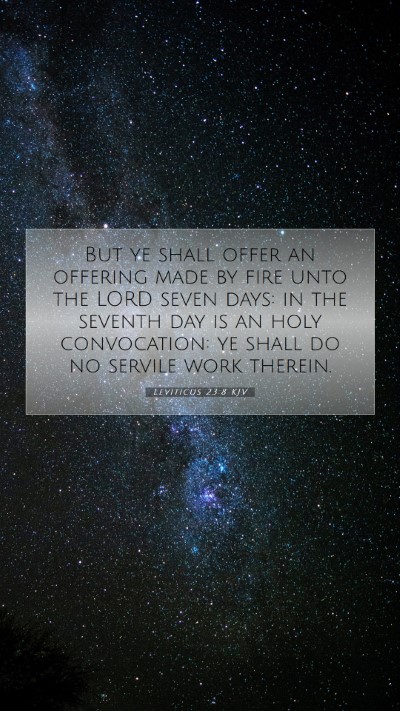Understanding Leviticus 23:8
Bible Verse: Leviticus 23:8
In Leviticus 23:8, we encounter an important directive from God to the Israelites regarding the Feast of Unleavened Bread. This scripture can be summarized as follows:
"But you shall offer an offering made by fire to the Lord for seven days. The seventh day shall be a holy convocation; you shall do no customary work on it."
Summary of the Verse Meaning
This verse encapsulates God’s command for the people to observe a significant period of spiritual reflection and communal worship. By examining insights from public domain commentaries, we can glean a deeper understanding of this verse.
Insights from Matthew Henry
Matthew Henry's commentary emphasizes several key points:
- Significance of Feast Days: Henry notes the significance of the Feast of Unleavened Bread as a time to commemorate the Israelites' exodus from Egypt. It underscores the importance of remembering God’s deliverance and grace.
- Offering to the Lord: The command to offer sacrifices signifies the people's gratitude and acknowledgment of God’s provision during their journey.
- Restoration and Reflection: The holy convocation on the seventh day is instructive in emphasizing rest and reflection, allowing for spiritual rejuvenation.
Insights from Albert Barnes
Albert Barnes provides an analytical perspective on the observance of such feasts:
- Cultural Practices: Barnes points out that the repetition of this festival ties Israel's life to agrarian cycles and divine favor, linking their identity with religious observances.
- Expectation of Worship: He also underscores that these festivals served not only as a religious obligation but as a communal gathering that fostered a sense of togetherness among the Israelites.
- Symbol of Cleansing: The removal of leaven represents a call to purification, paralleling the spiritual cleansing God expects from His people.
Insights from Adam Clarke
Adam Clarke's commentary highlights further nuances:
- Distinction of Days: Clarke emphasizes that each day of the feast has its importance, culminating in a day dedicated to complete rest and focus on God.
- Religious Obedience: He highlights the necessity of obedience in following God’s command, which implies a structure to their worship that fosters discipline.
- Importance of Sacrifice: The offerings made during this feast were crucial in maintaining a covenant relationship with God, illustrating an essential tenet of their faith.
Cross References
- Exodus 12:15 - Discusses the removal of leaven during the Passover.
- Deuteronomy 16:3 - Exhorts the Israelites to remember their journey out of Egypt.
- Matthew 26:17-19 - Jesus’ observance of the Passover and its significance.
Application and Relevance Today
The directives found in Leviticus 23:8 are not just historical; they hold ongoing significance for modern believers in several ways:
- Spiritual Reflectiveness: Just as Israel was commanded to remember their deliverance, contemporary readers can reflect on their personal journey of faith and spiritual growth.
- Community Worship: Engaging in communal worship and celebration fosters unity among believers.
- Symbolic Cleansing: The principle of removing 'leaven' serves as a metaphor for life; believers are challenged to examine their hearts and lives for impurities.
Conclusion
In summary, Leviticus 23:8 calls for a comprehensive understanding of worship, obedience, and remembrance. Utilizing various Bible verse interpretations, such as those provided by respected commentators like Matthew Henry, Albert Barnes, and Adam Clarke, can enrich one's study of Scripture and enhance one’s spiritual journey.
As readers engage with this verse and its rich commentary, they are encouraged to explore the broader context of the Book of Leviticus, examining the themes of sacrifice and holiness that are central to the text, as well as applying its principles to their daily lives.


